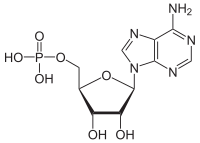
Photo from wikipedia
Sesamol is a phenol derivative of sesame oil and a potent anti-oxidant, anti-inflammatory, anti-hepatotoxic, and anti-aging compound. We investigated the effects of sesamol on the molecular mechanisms of adipogenesis in… Click to show full abstract
Sesamol is a phenol derivative of sesame oil and a potent anti-oxidant, anti-inflammatory, anti-hepatotoxic, and anti-aging compound. We investigated the effects of sesamol on the molecular mechanisms of adipogenesis in 3T3-L1 preadipocytes. The intracellular lipid accumulation accompanied by increased extracellular release of free glycerol was decreased during differentiation on treating 3T3-L1 with sesamol. Sesamol treatment on 3T3-L1 inhibited adipogenic differentiation by down-regulating adipogenesis-related factors (C/EBPα, PPARγ, and SREBP-1). Lipid accumulation was repressed by decreasing fatty acid synthase and by up-regulating lipolysis-response genes (HSL and LPL). The molecular mechanisms of sesamol-induced inhibition in adipogenesis were mediated by increased levels of phosphorylated adenosine monophosphate-activated protein kinase and its substrate acetyl-CoA carboxylase. Sesamol treatment, in turn, modulated the different members of the mitogenactivated protein kinase family by suppressing phosphorylation of ERK 1/2 and JNK and by increasing the phosphorylation of p38. In summary, sesamol inhibits adipogenic differentiation by reducing phosphorylation levels of ERK 1/2 and JNK while inducing lipolysis by activating p38 and AMPK. Our results demonstrate that the molecular mechanisms of in vitro anti-obesity effects of sesamol are due to the combined effects of preventing both lipid accumulation and adipogenesis.
Journal Title: Food Science and Biotechnology
Year Published: 2017
Link to full text (if available)
Share on Social Media: Sign Up to like & get
recommendations!